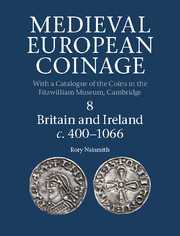Book contents
- Frontmatter
- Contents
- List of plates
- List of figures
- List of maps
- List of tables
- Preface
- Note on spelling
- List of abbreviations
- 1 Introduction
- 2 From Roman Britain To Anglo-Saxon England
- 3 Early Anglo-Saxon Gold Coinage
- 4 The Early Silver Pennies
- 5 The Kingdom Of Northumbria
- 6 The ‘Mercian Supremacy’ In The Age Of Offa And Coenwulf
- 7 The Rise Of Wessex In Southern England
- 8 The Reign Of Alfred The Great
- 9 England From Edward The Elder To Edgar's Reform
- 10 The Late Anglo-Saxon Coinage
- 11 The Anglo-Viking Coinages
- 12 Wales And Scotland
- 13 The Isle Of Man And ‘Irish Sea’ Coinages
- 14 Ireland To 1170 (with Andrew Woods)
- APPENDICES
- Bibliography
- CATALOGUE
- Concordances
- Indexes
6 - The ‘Mercian Supremacy’ In The Age Of Offa And Coenwulf
Published online by Cambridge University Press: 11 May 2017
- Frontmatter
- Contents
- List of plates
- List of figures
- List of maps
- List of tables
- Preface
- Note on spelling
- List of abbreviations
- 1 Introduction
- 2 From Roman Britain To Anglo-Saxon England
- 3 Early Anglo-Saxon Gold Coinage
- 4 The Early Silver Pennies
- 5 The Kingdom Of Northumbria
- 6 The ‘Mercian Supremacy’ In The Age Of Offa And Coenwulf
- 7 The Rise Of Wessex In Southern England
- 8 The Reign Of Alfred The Great
- 9 England From Edward The Elder To Edgar's Reform
- 10 The Late Anglo-Saxon Coinage
- 11 The Anglo-Viking Coinages
- 12 Wales And Scotland
- 13 The Isle Of Man And ‘Irish Sea’ Coinages
- 14 Ireland To 1170 (with Andrew Woods)
- APPENDICES
- Bibliography
- CATALOGUE
- Concordances
- Indexes
Summary
HISTORICAL INTRODUCTION
In 1918, the great historian Sir Frank Stenton was the first to designate the period from the time of Penda (d. 655) to Coenwulf as the ‘Mercian supremacy’ (Stenton 1918; cf. Keynes 2005, 1–7): a century and a half during which the kingdom of the Mercians, with its heartland in the region around Tamworth and Lichfield, exercised hegemony over England south of the Humber. The long reigns of Æthelbald (716–57), Off a (757–96) and Coenwulf (796–821) saw the high-water mark of Mercian power. Charlemagne negotiated with Off a as a peer, and the Mercian king's influence was thought to stretch all the way to Rome (Wallace-Hadrill 1971, 98–123; Story 2003). In England, the dyke marking the western frontier of the Mercian kingdom was completed and augmented (Hill and Worthington 2003). Military campaigns subdued resistance in Sussex in 771 and pacified the king of the West Saxons in 779. Mercian kings also mounted several expeditions against the Welsh (Charles-Edwards 2001).
Despite its formidable achievements in the seventh, eighth and ninth centuries, the kingdom of the Mercians has not been fortunate in its historical legacy. It was not the focus of any major narrative historical text, and fared poorly in those composed by outsiders. Bede in his Historia ecclesiastica showed relatively little interest in contemporary events (and especially those outside Northumbria), while the later ninth-century Anglo-Saxon Chronicle was written from an essentially West Saxon point of view; it had little to say about Mercia, and still less that was complimentary. Letters from the circles of two Englishmen working on the continent – the West Saxon Boniface (d. 754) and the Northumbrian Alcuin (d. 804) – shed some light on conditions within the Mercian Church and the royal house, but charters, manuscripts and archaeological remains are essential in piecing together the history of Mercia during its heyday.
Stenton, like others before him, recognised that the Mercian supremacy did not involve the total suppression of subordinate territorial and political identities. As far back as the time when Bede was completing his Historia ecclesiastica in 731, Mercian power was seen as a matter of being overlord of a patchwork of subordinate territories (Bede, HE v.23).
- Type
- Chapter
- Information
- Medieval European Coinage , pp. 128 - 145Publisher: Cambridge University PressPrint publication year: 2017



